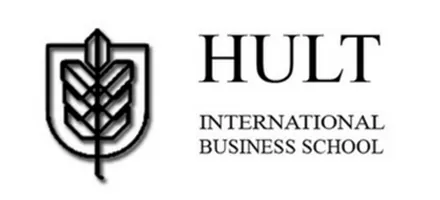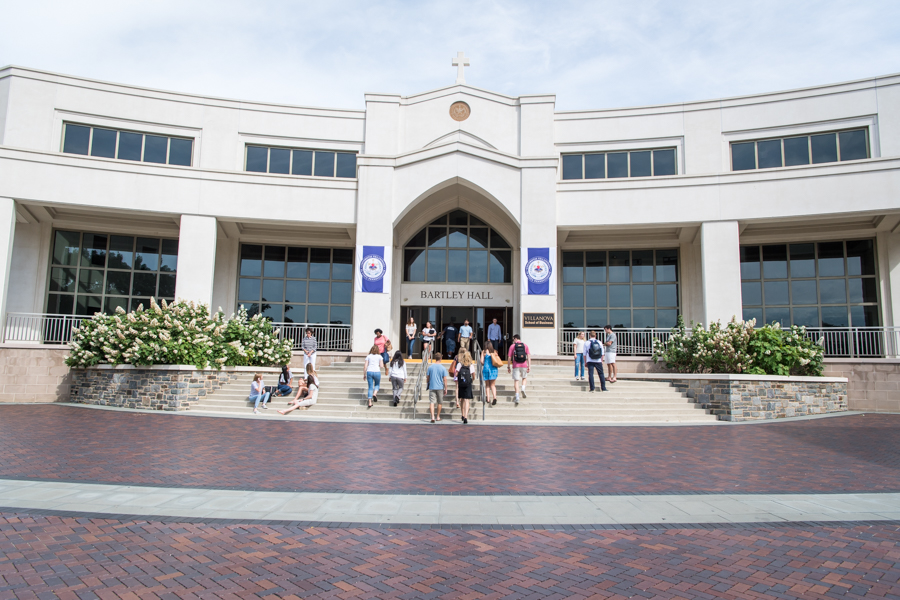
Bartley Hall at Villanova School of Business. Courtesy photo
Annie O’Connor always had her eye on business, but getting into the Villanova School of Business is no easy task. The school accepted just 18% of applicants in Fall of 2023, the 18th most selective business school in our 2024 ranking of undergraduate business programs.
Instead, she majored in communications at Villanova University’s College of Liberal Arts and Sciences. She figured she would explore business through her economics minor and any other opportunities she found along the way.
Turns out, she found exactly what she was looking for in Villanova School of Business’ Summer Business Institute (SBI). Over 10 intense weeks in the summer after her sophomore year, O’Conner earned a minor in business and, though she didn’t know it at the time, launched a career she previously hadn’t imagined.
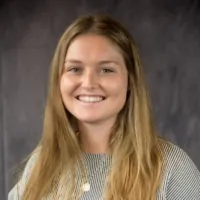
Annie O’Connor, Class of 2021
“Learning how to properly network was huge and not something I had ever thought a lot about. Since completing SBI, I know how valuable it can be,” says O’Connor, a 2021 Villanova graduate and now Sales Planner at The Athletic, a digital sports journalism platform and the venerated sports department of the New York Times.
Her networking skills, in fact, helped land her first job out of college. In a course she took at the business school, her class was doing a presentation to Disney’s media agency. “At the end of the class, I joked that I was a senior and still looking for a job. One of the agency reps gave me his contact information, and a few months later, I started as an assistant media planner at the same company, applying things I learned in my SBI social media marketing courses”
A BUSINESS MINOR FOR NON-BUSINESS MAJORS
Since 1997, VBS’ Summer Business Institute has provided non-business majors at Villanova University – and occasionally students from other universities – with a rigorous, 16-credit, 10-week program that functions as a business minor. Nearly 2,500 students have completed the SBI to date.
Some 130 students took the course this summer, starting right after Villanova graduation ceremonies. Most come from the College of Liberal Arts & Sciences, the largest college at the university. Of those, about half are liberal arts majors and nearly 20% are science majors. Engineering students make up between a quarter and a third of enrollees.
“It just shows how vital learning and understanding business is, no matter what career you choose,” says Assistant Dean Cathy Toner who teaches business law in SBI as well as for the business school. “I think there’s a realization among students that even if they’re going into the medical field, if they are going to be a scientist, they still need to understand and be able to engage in business because, now, everything is business.”
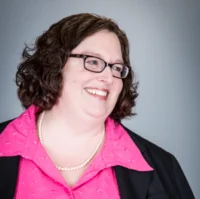
Cathy Toner, Assistant Dean
SBI allows these students to earn a minor in business without interrupting their packed course schedules for their majors. In the accelerated 10-week format, they get all the business fundamentals: business law, economics, accounting, management, marketing, etc. It also gives them space to complete internships in the second half of the summer and, ideally, apply their new skills immediately.
Like so many other programs across the country, SBI went fully online during pandemic restrictions. The move made enrollments soar, and was widely popular among students. VBS decided to make the change permanent, and while enrollments have stabilized from the COVID high of 157 students, they are still higher than when the program was fully on-campus. In 2019, the program had about 80 students, and last summer about 140.
Courses are delivered through a mix of live virtual and asynchronous sessions, but instructors have been intentional in creating space for networking, group work, and team presentations.
The virtual format gives the program room to grow, which Toner suspects that it will. Demand from Villanova students continues to be robust, mostly via word-of-mouth from past students.
“Students love credentials, and a business minor from a school like VSB is pretty valuable,” Toner says.
CRAFTING THE PERFECT ELEVATOR PITCH
This summer, VSB also introduced a shorter, four-week program called Summer Business Academy (SBA) in which students earn a six-credit, VSB business certificate. Nineteen students enrolled in the inaugural class.
“We heard from students that 10 weeks is a lot. It’s very intense. There were students who wanted to get an understanding of business, but maybe not a whole minor,” Toner says. “We also had students who have internships and go to work over the summer, and the shorter program enables them to do both.”
Both the longer summer institute and the shorter academy include a built-in professional development credit. It starts with a CliftonStrengths assessment to help students understand their strengths and natural talents, and how to successfully apply them. Students also develop their personal brand elevator pitches, connect with VIP alumni mentors, virtually meet employers, work on interview skills and fine-tune their resumes. They learn to network, one of the essential skills of the business major.
In fact, networking through Nova Network and Villanova alumni on LinkedIn was the most valuable part of the shorter academy program for sociology major Hailey Rebak, Class of 2026. She’s already using her skills to search for internships.
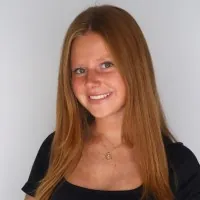
Hailey Rebak, Class of 2026
And, as someone who gets nervous in formal one-on-ones, the academy was the chance to practice interviews with both peers and real employers. She developed a skill she’ll use the rest of her life.
“Knowing that I have a set elevator pitch that has been so frequently practiced, and correctly altered, gives me the confidence for going into future interviews,” she says.
Rebak is minoring in both criminology and communications and enrolled in the academy to explore the business implications of all her study interests. She also hoped it would help her figure out a more definite career path. As director of social events for her sorority, she’s always been interested in event planning, and the lessons learned in the summer academy have sparked ideas on how to pursue it.
“I am sure, now, that my sociology major and communications minor will be incredibly beneficial when going into event planning. The ability to read and connect with others will allow me to create events that people will properly enjoy,” she says. “From SBA, I have learned that there are so many aspects to the business world, opening up so many opportunities.”
DON’T MISS: THE TENURE PROJECT: INCREASING THE NUMBER OF BLACK, HISPANIC & INDIGENOUS B-SCHOOL FACULTY AND THE P&Q INTERVIEW: AFTER 29 YEARS AT VILLANOVA, NEW B-SCHOOL DEAN LOOKS TO THE FUTURE





